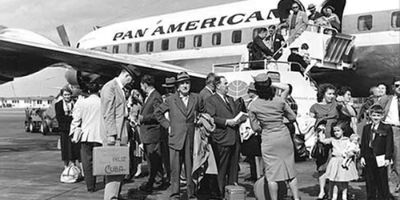Why counter-revolution? Why covert ops and exile forces? (15 nov 1960 anni – 30 ottob 1968 anni)
Descrizione:
Louis A. Pérez, Jr.,from his book Cuba, between Reform and Revolution, 2nd Edition Pg. 343:
"After 1961, one of the key elements of U.S. policy against Cuba was to isolate Cuba economically as a way to disrupt the Cuban economy, increase domestic distress, and encourage internal discontent — all designed to weaken the regime from within."
Almost from the start, Castro disappointed Cubans who had believed he would restore the 1940 Constitution and democracy, reversing the Batista era of harsh, corrupt, strongman rule.
Instead, Castro led with harsh suppression of opposition and soon followed with a crescendo of Soviet-inspired restructuring of industry and government, at first under pretexts of Cuban economic nationalism. Opposition to these movements was repressed as hostile and US-inspired: a charge that was not completely unfounded as the US stepped up the pressure against Cuba's emerging communist politics.
Soon after arriving in La Habana on Jan. 8, by Jan. 11, show trials and public executions of Batista officials, supporters and counter-revolutionaries had begun, and soon, important former Castro allies left the movement, founded counter-revolutionary movements, or were arrested as traitors to the revolution.
Soviet ties and arms deals began. Soviet missiles arrived in 1962, and Marxist-Leninist doctrine was implemented in labor and education. Government agencies and military were disbanded and reorganized under orthodox Communist party political structures with political officers supervising loyalty to regime and doctrine.
Castro admitted privately on Dec 2, 1961, and declared officially on April 16, 1961, that Cuba was a Communist state.
Both the Eisenhower and Kennedy administrations insisted on "plausible deniability" for US-planned anti-Castro exile actions, to avoid the risks of escalation with the USSR, to avoid substantiating the Soviets' anti-American propaganda, and other forms of political embarrassment. Kennedy preferred covert activities be carried out by local Cuban anti-Castro forces, infiltrated espionage and special ops units from within Cuba.
The US had equipped, trained and infiltrated local anti-Castro Cuban forces, and at one point the Cuba-infiltrated covert units made up the largest US espionage operation in a Communist country anywhere in the world; but neither these units nor the CIA had the scale to meet Kennedy's wish for autonomous, "blown-cover-proof" operations, and most raids were hit-and-run maritime landings from staging areas outside Cuba in the Florida Keys or the Bahamas.
Thus at the outset of the covert war, the requirements for success were already at odds with political and foreign policy reality, which mandated limited war and minimization of political risk to the US.
Later the exile landing operations came to be viewed as ineffective, or as counter-productive "pinpricks". The JFK administration directed that these activities be brought back into CIA direct management, or discontinued. US Customs and Coast Guard began intercepting these maritime sorties fielded by Alpha-66, organized in Miami and launching from marinas in the Florida Keys and the Bahamas.
https://history.state.gov/historicaldocuments/frus1961-63v11/d303
Despite the deactivation of supported counter-revolutionary groups, the CIA resumed planning for a full-scale assault, called Operation Mongoose. The headquarters for the operation was located in south Miami-Dade county, in an annex of the University of Miami, adjacent to a former naval base; in 2023, it is the site of a Coast Guard base, the Miami Military Museum, and site of a radio-interception antenna farm possibly still used for intelligence purposes.
Operation Mongoose ran under cover of a commercial business called Zenith. It was deactivated by about 1968, as political momentum ebbed away. As US military and intelligence attempted to revive invasion plans, Castro's popularity was rising as a leader of a "non-aligned movement", and US policy-makers apparently could not defy this tide or find an opportune moment to reactivate an effort to overthrow the Castro regime counting on international support, at a time when Castro was a rising figure in the developing world.
Exile activity had shifted to domestic targets: bombings on Cuban political, diplomatic and cultural arts targets, and Soviet entities in the US. Bombings and assassinations were planned, funded and carried out in New Jersey, Washington, DC and Miami by exile groups like Omega 7 into the 1980s. In Miami, targets like an exile magazine publisher, a radio host's car, and a cigar store were firebombed; the victims of these attacks had proposed or been part of a "dialogue" with the Castro regime, something that was still out of the question for the militant exile organizations.
The FBI continued to investigate and prosecute exile-supported attacks as well as pursue its counter-intelligence mandate against Cuban espionage. Omega 7 leader Eduardo Arocena was arrested and imprisoned for a longer term before his 2014 release on humanitarian health grounds. Exile militants meanwhile viewed these prosecutions of anti-Castro-inspired domestic attacks on Cuba-related political and cultural targets inside the US as a betrayal by the US, and viewed the prosecutions as explicit support of Castro by the United States.
Aggiunto al nastro di tempo:
Data:
15 nov 1960 anni
30 ottob 1968 anni
~ 7 years and 11 months
